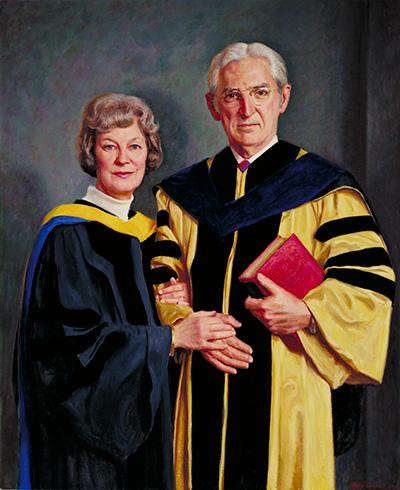Georgeanna Seegar Jones and Howard W. Jones, Jr.

Georgeanna Seegar Jones and Howard W. Jones, Jr.
- Artist:
- Henry Cooper
- Date:
- 1977
- Medium:
- Oil on canvas
- Dimensions:
- 45 x 37.5 in.
Georgeanna Seegar Jones
1912-2005
Jones, a pioneer in reproductive endocrinology at Johns Hopkins, was born in Baltimore. She received her B.A. in chemistry from Goucher College in 1932 and her M.D. from the Johns Hopkins University School of Medicine in 1936. After graduation, Jones served as a house officer in gynecology from 1936 to 1937, and as a National Cancer Institute Trainee from 1937 to 1938, both at The Johns Hopkins Hospital. She then trained in endocrinology laboratory research in the department of surgery at the Johns Hopkins University School of Medicine from 1938 to 1939.
Jones was appointed gynecologist and director of the laboratory of reproductive physiology, and gynecologist-in-charge of the Gynecological Endocrine Clinic at The Johns Hopkins Hospital in 1939. Jones and her husband Howard Jones, Jr. joined the part-time faculty in 1948, and maintained private practices as well. She was promoted to associate professor in 1957 and joined the full-time faculty in 1960.
Jones retired from Johns Hopkins in 1978 and was appointed professor of obstetrics and gynecology at Eastern Virginia Medical School, where along with her husband, they established the first in vitro fertilization (IVF) program in the United States and successfully induced the nation’s first IVF baby in 1981. Both Jones and her husband became international spokespeople for the new field of reproductive medicine and were the only American gynecologists to advise Pope John Paul II on IVF.
Along with her husband, she served as co-editor-in-chief for the Gynecological & Obstetrical Survey. Jones was a member of several professional societies including the Baltimore City Medical Society, The Medical and Chirurgical Faculty of the State of Maryland, the American Medical Society, and the Southern Medical Society. In 1970, she was elected the first female president of the American Fertility Society. Jones wrote over ninety articles and book chapters during her career. In 1970, Goucher College awarded her an honorary doctor of science degree. Jones and her husband were honored by the Johns Hopkins University School of Medicine in 2011 with the dedication of the Howard W. Jones, Jr. and Georgeanna Seegar Jones Lectureship.
Howard W. Jones Jr.
1910-2015
Jones, a pioneer in reproductive endocrinology at Johns Hopkins, was born in Baltimore. He received his A.B. from Amherst College in 1931 and his M.D. from the Johns Hopkins University School of Medicine in 1935. Following his graduation from Johns Hopkins, Jones completed his internship and residency in general surgery under Howard Kelly, and later Thomas S. Cullen.
During World War II, Jones served in the U. S. Army as a general battlefield surgeon with the rank of major. He was part of General George S. Patton, Jr.’s Third Army as it fought its way across France and Germany. Returning to Johns Hopkins following the war, Jones spent six months as a resident in gynecology. He joined the Johns Hopkins part-time faculty in 1948, and maintained a private practice. He was appointed to the full-time faculty in 1960. Jones was also a visiting gynecologist at Church Home and Hospital, Union Memorial Hospital, Bon Secour Hospital, and St. Agnes Hospital.
Jones established the cryogenetics laboratory at Johns Hopkins when the field was in its infancy and pioneered gynecologic surgery, particularly in operating on babies born with ambiguous genitalia. In 1965, he helped found the Johns Hopkins Gender Identity Clinic, the first sex-change clinic in an American hospital. He also began work with in vitro fertilization (IVF) in 1965, when he helped arrange for British scientist Robert Edwards to come to Johns Hopkins as a fellow to conduct experiments aimed at achieving the first fertilization of a human egg outside of the body, something he already had accomplished with mice. Working together and with others, Jones and Edwards succeeded in the experiments but did not recognize the indicators at the time.
Jones retired from Johns Hopkins in 1978 and was appointed professor of obstetrics and gynecology at Eastern Virginia Medical School, where together with his wife Georgeanna Seegar Jones he established the first IVF program in the United States. They successfully induced the nation’s first IVF baby, and the female child was born in 1981; Jones called her every year on her birthday until his death. The Joneses became international spokespeople for the new field of reproductive medicine and were the only American gynecologists to advise Pope John Paul II on IVF.
Jones wrote more than 100 articles over the course of his career, and his final publication was the book In Vitro Fertilization Comes to America: Memoir of a Medical Breakthrough, published just one year before his death. Jones and his wife were honored by Johns Hopkins in 2011 with the dedication of the Howard W. Jones, Jr. and Georgeanna Seegar Jones lectureship.
"*" indicates required fields
